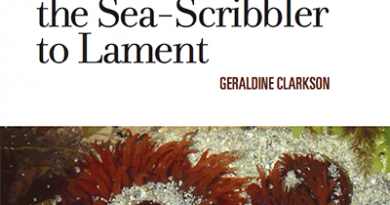Steps by Mark Goodwin
– Reviewed by Sarah Hymas –
The front cover of Steps, Mark Goodwin’s sixth title, shows a sea slater, a relative of the woodlouse, which inhabits coastal areas. It is a small creature, growing to a maximum of 3cm, an entirely appropriate image for a book which explores walking in the world (or, at least, England, Ethiopia, Spain and Wales) and the multitude of ways in which it can be experienced.
If I were to pick one (short) poem that embodies the ethos of this book, I’d choose ‘Step from I’, a mantra that plays with rhythm, repetition and word spacing to present a topographical landscape through the physical act of walking rather than through description. We walk away from ourselves and into ourselves: the landscape is not us, but somehow we make it us as we pass through it. The poem begins:
side-step blood step step in time step
whiffs each step to step amongst aboutto step steep slate-stepped key stepping
descending steps towards ascending steps
You can read the entire poem on the Steps website, perhaps suggesting that the poet shares my belief in its centrality to the collection.
While it is not the most adventurous poem in its punctuation, it hints at how Goodwin pushes language and form to hold the physical. He seeks the visceral potential of language, slipping it from its intellectual mantle to bare muscle and sinew. This doesn’t always make it transparent in meaning, but read it aloud and you get as close to walking as you can from an armchair. ‘Walk’ is instructive, inviting you to pick your way into a precarious landscape, ending with the promise: “Without knowing / know’.
This unknowing knowing extends to the names of places: throughout the book, especially in the long poem ‘From a St Juliot to Beyond a Beeny, a Walk in a North Cornwall’, Goodwin dances around the capitalisation of place names: not simply whether they begin with or without caps, but which letters are captialised inside the name, inverting the name’s original sense: “Vast At L’Antic”, “Bosk Astle” (which also becomes “Bo Scattle” and “Bog Cattle”) and “Pen Ally Hill”. In his spirited use of line breaks, he is quite at home with splitting the name over lines:
cri
ss-cro
ssed & su
ddenly I under
stand Ker
now’s flag a f
lapping of en
twined dry and dren
ched gone &
This is the stand-out poem of the book. At seventy pages long, I felt it deserved a publication to itself, signed “by A. Mark Goodwin”. A note at the back explains that this use of the indefinite article (in other, unexpected, places too) highlights the momentariness of any person being in a place (I summarise inadequately compared to Goodwin’s fuller, more persuasive argument). The poem begins by recommending the best maps to accompany the reading, and grid references pepper the right hand margins, alongside clusters of paler words highlighting the end (sometimes the beginning) words of lines. Goodwin also notates kilometres walked alongside the poem (referring back to the kilometre by kilometre breakdown of the walk in an itinerary, a little like a Greek chorus, at the beginning of the poem). These marginalia add to the layering of navigating, walking and remembering a landscape (or “land’s cape”, as he refers to it in the end note).
This layering also stacks up in the poem itself: We know where he’s walked, are invited to trace it on a map, then read the trembling experience of churchyard, river, companionship, encounters and memory. I call it trembling, and used the word precarious earlier, because this experience layered up into a multitudinous moment reads as though it’s walking a tightrope. This is a heightened, attentive journey through landscape as body. Lack of punctuation (apart from line and section breaks) adds to this fluidity, albeit sometimes stumbling over meaning, and this returns to the notion of language being a physical thing. Of course we stumble. Of course it is precarious. We are on a coastal path, we see the sea below, water runs between river, foam and sea. We are on “path-pebbles / & bits trees lose / bark-dust & leaf fibres…” There are missed sightings of birds. There is “seen noise”. The sudden activity of car parks is so shocking it is rendered in prose poetry that pounds out of the skinny stanzas teetering down the pages. And there is love; what can be more precarious?
There isn’t much overt personal information in the poem, but what is there is not denied its painfully insecure force:
… I love her
so much as
she makes
her sea-wishes
to be
another being she
or a she of her
needs but
I know she
would never
willingly leave …
Insecure because of the power of it. Because of the shared memory of this walk. Because he writes “with what I hope is love / and not a poet’s arrogance”. Because we’re also told poems have ghosts. This one’s ghost will linger in my mind, an observant and challenging companion when I’m next out for a walk.



